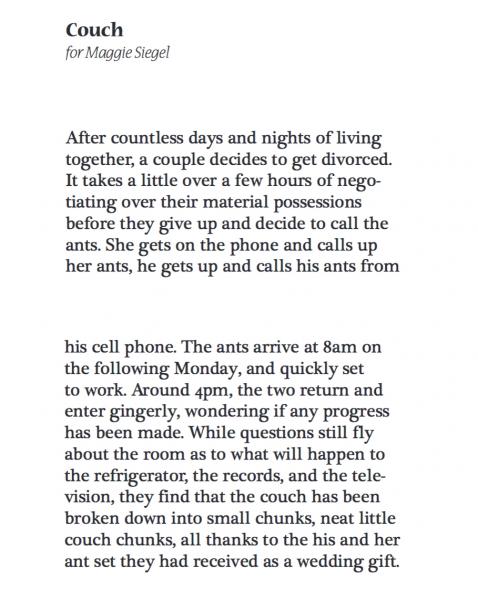
First reading of Sawako Nakayasu's 'Couch' (3)
Robert Archambeau

I’ve been asked to have a look at Sawako Nakayasu's prose poem "Couch." In a very nice email Brian Reed, Craig Dworkin, and Al Filreis say they “really hope you will provide your initial approach to the experience of reading and trying to discern or understand or deal with the poem as you encounter it.” Already I feel I’m in trouble. It’s not that I’m afraid to express doubts or show uncertainties or be somehow wrong, but I wonder if there isn’t some lack of clarity in the assignment. They want my “initial approach to the experience of reading,” and I’m not at all sure what that means. Usually, my initial experience is to root around for context — is this what Brian, Craig, and Al want? I’m not sure, because I’m not sure if they’d consider that a part of the experience of reading. I suppose I could ask, but I rather imagine they’d tell me to do what I thought best, so I’m just going to go ahead and read the text without a lot of investigation about the author of “Couch” or even of the collection from which it comes.
So then, “Couch,” by Sawako Nakayasu. Didn’t she have a book out from Burning Deck a few years back? Burning Deck sends me a lot of books, and I read most of them, but I don’t remember reading Nakayasu. My loss: but already I have some context, despite myself. Stay in the poetry game long enough and there’s not much chance of being a tabula rasa. Given what Burning Deck is all about, I’m guessing “Couch” will be odd, interesting, and in some kind of dialogue with European avant-garde traditions.
As I read I feel pretty confirmed in these presuppositions: “Couch” reads like a French or Belgian Surrealist prose poem. Nakayasu’s name would have led me (perhaps wrongly or stupidly) to assume she’s got some connection to Japanese poetry, but I don’t speak Japanese and have read only the classic Japanese poets in translation, so I wouldn’t be able to tell if she’s relating to what the poets are doing in Nagoya or Osaka nowadays. But I do know enough about Francophone Surrealism to see that Nakayasu’s likely to have some kind of contact with that tradition: the narrative is sort of wry, sideways-funny, and feels like an incomplete allegory. “Couch” has a lot of ordinary, bourgeois realism in it: a couple getting divorced and trying to find a civil way to divide their possession, a domestic setting, and realist cues like exact times of arrival and departure. But it also has an understated wackiness (the powers of the ants). It could almost be something the Piqueray twins wrote back in the fifties.
The most interesting thing about “Couch,” to me, is how it seems to pose a little puzzle. We accept, or at least I do, the premise that ants in the world of the poem have some kind of special status: you can send them off into the world, and they can drop by and help you sort out what to do with your worldly goods. We can take all of that as given, without question, the way we take the transformation of a man into a cockroach in Kafka’s Metamorphosis. But within this context, there is a question, or series of questions: if the ants themselves were a wedding present, and they’ve been divided up already, hasn’t the couple already found a way to divide their possessions? Aren’t the ants, who are called in to find a solution to the problem of who owns what, already representatives of some kind of solution? So if the couple has divided their ants on some principle, don’t they already have a principle for dividing the property? And if so, why would the need the ants to come and help?
When we get to the end of “Couch,” we find that the ants were part of a “his and hers” gift set, so the questions resolve to a much greater degree than I expected they would: unlike the couple’s other possessions, the ants were pre-divided. Again, it’s easy to take it as a given that we’re in a world where there are his and her ant gift sets. But questions arise: is there an inherent pessimism in “his and her” wedding gifts, a sense that the time may come when things must be divided? Or does the interdependence of the two parts of the gift (there’s no need to label something “his” unless there is a corresponding “hers”) imply a unity that divorce destroys? If so, what are we to make of the usefulness of the division of the ants into “his” and “hers” now, at the moment of divorce? Here, after all, is a gift intended to help unify a couple turning out to have its greatest use as a means of assisting in the dissolution of their marriage. Is there some statement about all actions containing the seeds of their opposites lurking at the heart the poem?
In the end, the piece remains enigmatic on these issues. The whole feel of the piece is enigmatic, and not just because of hermeneutic questions. There is, for example, a nice juxtaposition of tone (deadpan), action (the sad quotidian actions of divorce), and characters (realist people, Surrealist ants). This combines to give us a distance from events, even a kind of comic distance. I like that. So I’m going to find that old Burning Deck book and give it a read.

Robert Archambeau’s books include Home and Variations (Salt Publishing, 2004), and Laureates and Heretics (University of Notre Dame Press, 2010). He has also edited a number of works, including Word Play Place: Essays on the Poetry of John Matthias, The &NOW Awards: The Best Innovative Writing, and Letters of Blood: English Writings of Göran Printz-Påhlson. He teaches at Lake Forest College.